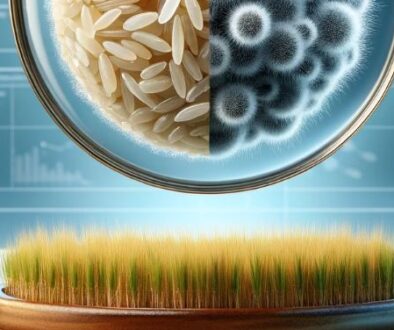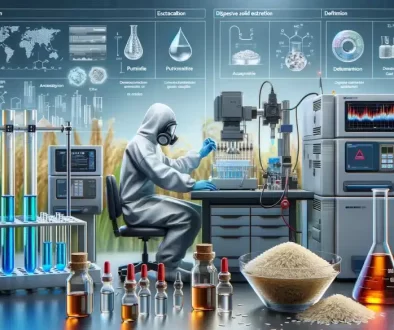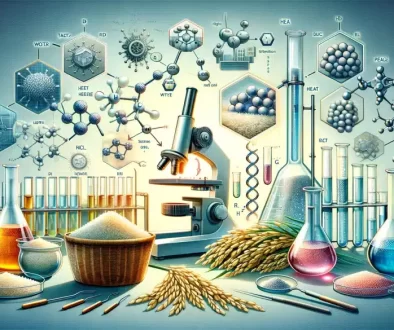Optimizing Pea Protein Peptides for Antioxidant Activity and Taste
Explore optimized pea protein peptides enhancing antioxidant activity with improved taste. Discover innovative debittering and enzymatic hydrolysis techniques for health foods
Keywords: Pretreatment; enzymatic hydrolysis; pea peptides; bitterness; antioxidant activity
Pea protein, known for its low allergenicity and rich amino acid composition, serves as an excellent plant protein source for the enzymatic production of antioxidant peptides. However, challenges such as low hydrolysis efficiency and the bitterness of hydrolysates have limited its application. This study aims to address these issues by applying heat treatment combined with a sequential dual-enzyme method to produce pea antioxidant peptides with high yield and low bitterness, providing a theoretical basis and new insights for the production of such peptides.
Enzymatic Hydrolysis Optimization
The study first analyzed the impact of enzyme types and addition methods on the hydrolysis of pea protein, discovering that the stepwise enzymatic hydrolysis using alkaline protease and composite protease outperformed the single and simultaneous enzymatic processes. To further enhance hydrolysis efficiency, pea protein was pretreated with heat treatment and high-speed shearing. Fourier Transform Infrared Spectroscopy (FTIR) analysis of the secondary structure revealed that pretreatment decreased the protein’s orderliness, unfolded the molecular structure, and increased the contact points with enzymes. Scanning Electron Microscopy (SEM) observations showed increased surface porosity and damage to the protein, enhancing the contact area with enzymes and significantly improving hydrolysis efficiency, particularly after heat treatment. This resulted in a 5.5% increase in protein recovery, a 9.6% decrease in insoluble peptide ratio, an 18.4% increase in amino acid content, and peptides with a molecular weight below 1000 Da accounting for 82.8%. The final enzymatic hydrolysis conditions were established as follows: heat treatment of pea protein at 95℃ for 10 minutes, followed by the addition of alkaline protease (pH 8.5, 55°C, 3%) and composite protease (pH 7.0, 50°C, 1%) for sequential hydrolysis for 2.5 hours and 1 hour, respectively.
Debittering Process and Analysis
The study then addressed the bitterness of pea peptides by comparing their bitterness intensity with that of commercial pea peptides and evaluating the debittering effects of several food-grade mild agents (tert-butanol, flavorzyme, and β-cyclodextrin (β-CD)) at different concentrations. A Partial Least Squares Regression (PLSR) model was established to analyze the correlation between the sensory indicators of pea peptides and their composition. The debittering treatment with tert-butanol (1:4, w/w) and β-CD (1.5%, w/v) significantly reduced bitterness, achieving the lowest bitterness score (0.3), electronic tongue bitterness response value (1.15), the lowest content of bitter amino acids (1007.57 mg/100 g), and the lowest proportion of peptides with molecular weights between 180-500 Da (5.43%). Therefore, this condition was chosen for the final debittering process and further structural characterization. FTIR and 1H-NMR spectroscopy results indicated that tert-butanol treatment not only removed some bitter peptides but also facilitated the exposure of hydrophobic domains, enhancing the inclusion of hydrophobic amino acids in pea peptides by β-CD to mask bitterness.
Antioxidant Activity Evaluation
Lastly, the study evaluated the impact of combined debittering on the antioxidant activity of pea peptides. The IC50 values for DPPH radical scavenging activity, ABTS radical scavenging activity, and Fe2+ chelating activity of debittered pea peptides increased from 2.63 mg/mL, 0.85 mg/mL, and 1.69 mg/mL to 3.63 mg/mL, 1.67 mg/mL, and 2.95 mg/mL, respectively. Using a H2O2-induced oxidative damage model with a H2O2 concentration of 600 μM, where cell viability was 50.80%, the study further explored the protective effect of pea peptides against cellular oxidative damage. Both before and after debittering, pea peptides were able to protect HepG2 cells from H2O2-induced damage by reducing reactive oxygen species (ROS) and malondialdehyde (MDA) levels and promoting the expression of superoxide dismutase (SOD), catalase (CAT), and glutathione peroxidase (GSH-Px). Notably, debittered pea peptides achieved almost equivalent activity at higher concentrations compared to before debittering. Therefore, pea peptides, both before and after debittering, can be applied in pharmaceuticals or functional foods with varying sensory requirements.
For more further detailed information of this research, feel free to contact our team for asssistance.
Original research by Xia Yixuan, Zhang Hui, Hui Ju, Mu Wanmeng (Food Engineering, Jiangnan University, Wuxi 214122)
About ETprotein:
ETprotein, a reputable rice protein Chinese factory manufacturer and supplier, is renowned for producing, stocking, exporting, and delivering the highest quality organic bulk vegan protein and plant proteins. They include Organic rice protein, clear rice protein, pea protein, clear pea protein, pumpkin seed protein, sunflower seed protein, mung bean protein, etc. Our offerings, characterized by a neutral taste, non-GMO, allergen-free attributes, cater to a diverse range of industries. We serve nutraceutical, pharmaceutical, cosmeceutical, veterinary, as well as food and beverage finished product distributors, traders, and manufacturers across Europe, USA, Canada, Australia, Thailand, Japan, Korea, Brazil, and Chile, among others.
Our specialization includes exporting and delivering tailor-made protein powder and finished nutritional supplements. Our extensive product range covers sectors like Food and Beverage, Sports Nutrition, Weight Management, Dietary Supplements, Health and Wellness Products, and Infant Formula, ensuring comprehensive solutions to meet all your protein needs.
As a trusted company by leading global food and beverage brands and Fortune 500 companies, ETprotein reinforces China’s reputation in the global arena. For more information or to sample our products, please contact us and email sales(at)ETprotein.com today.














